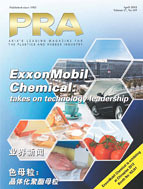 |
 |
In this Edition March 2012 |
FEATURED VIDEOS |
|
|
LEAD FEATURE |
COMPANY NEWS |
MATERIALS NEWS |
MACHINERY NEWS |
INJECTION MOULDING ASIA |
RUBBER JOURNAL ASIA |
PRA April 2012 Electronic Issue Now Available |
![]() Injection Moulding Asia
Injection Moulding Asia
Electric cars becoming less green
L
ong touted as clean, zero-emission alternatives to vehicles powered by fossil fuels, electric cars are now at the risk of being tainted, especially with the Japanese government's plans to reactivate idle nuclear power plants for electricity supply.Despite this, the government is not abandoning nuclear power and will restart some of the country's 54 reactors after safety checks are completed. Critics say that green cars should be powered by alternative energy such as solar, wind and other clean forms of energy that emit lower pollutants.
Since late 2010, automotive firm Nissan has sold 25,000 Leaf electric cars around the world, including 12,000 in Japan. It is targeting global sales of 1.5 million electric vehicles by 2015 in conjunction with alliance partner Renault of France.
The Leaf starts at about US$36,000 in Japan, after the US$9,400 green subsidy. In the U.S., the Leaf sells for about US$25,000 after applying a US$7,500 federal tax credit. Nissan says prices will come down with sales volume but infrastructure changes are slow in coming. Although the Leaf is now a front-runner among electric vehicles, Nissan faces competition from rivals that already offer them such as US luxury car maker Tesla Motors and Mitsubishi's i-MiEV mini car.
Growing concerns about global warming and the need to preserve nature will propel the market for electric cars. In addition, electric vehicles have a strong selling point - soaring petrol prices, that have shot up above US$100 a barrel lately from US$75 in October.


